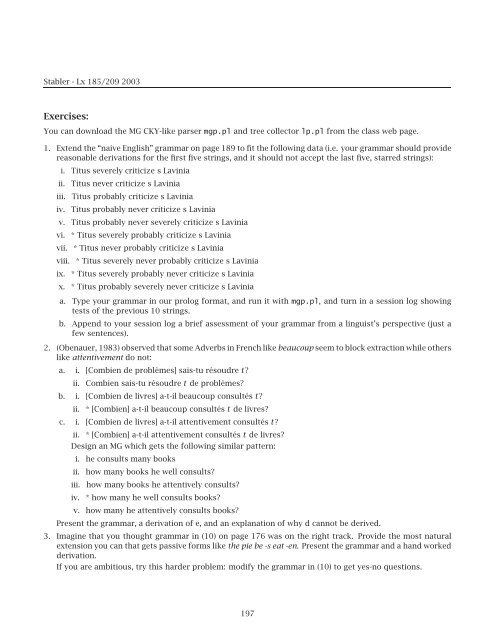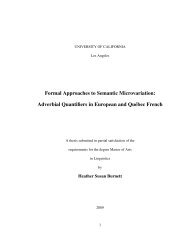Notes on computational linguistics.pdf - UCLA Department of ...
Notes on computational linguistics.pdf - UCLA Department of ...
Notes on computational linguistics.pdf - UCLA Department of ...
You also want an ePaper? Increase the reach of your titles
YUMPU automatically turns print PDFs into web optimized ePapers that Google loves.
Stabler - Lx 185/209 2003<br />
Exercises:<br />
You can download the MG CKY-like parser mgp.pl and tree collector lp.pl from the class web page.<br />
1. Extend the “naive English” grammar <strong>on</strong> page 189 to fit the following data (i.e. your grammar should provide<br />
reas<strong>on</strong>able derivati<strong>on</strong>s for the first five strings, and it should not accept the last five, starred strings):<br />
i. Titus severely criticize s Lavinia<br />
ii. Titus never criticize s Lavinia<br />
iii. Titus probably criticize s Lavinia<br />
iv. Titus probably never criticize s Lavinia<br />
v. Titus probably never severely criticize s Lavinia<br />
vi. * Titus severely probably criticize s Lavinia<br />
vii. * Titus never probably criticize s Lavinia<br />
viii. * Titus severely never probably criticize s Lavinia<br />
ix. * Titus severely probably never criticize s Lavinia<br />
x. * Titus probably severely never criticize s Lavinia<br />
a. Type your grammar in our prolog format, and run it with mgp.pl, and turn in a sessi<strong>on</strong> log showing<br />
tests <strong>of</strong> the previous 10 strings.<br />
b. Append to your sessi<strong>on</strong> log a brief assessment <strong>of</strong> your grammar from a linguist’s perspective (just a<br />
few sentences).<br />
2. (Obenauer, 1983) observed that some Adverbs in French like beaucoup seem to block extracti<strong>on</strong> while others<br />
like attentivement do not:<br />
a. i. [Combien de problèmes] sais-tu résoudre t?<br />
ii. Combien sais-tu résoudre t de problèmes?<br />
b. i. [Combien de livres] a-t-il beaucoup c<strong>on</strong>sultés t?<br />
ii. * [Combien] a-t-il beaucoup c<strong>on</strong>sultés t de livres?<br />
c. i. [Combien de livres] a-t-il attentivement c<strong>on</strong>sultés t?<br />
ii. * [Combien] a-t-il attentivement c<strong>on</strong>sultés t de livres?<br />
Design an MG which gets the following similar pattern:<br />
i. he c<strong>on</strong>sults many books<br />
ii. how many books he well c<strong>on</strong>sults?<br />
iii. how many books he attentively c<strong>on</strong>sults?<br />
iv. * how many he well c<strong>on</strong>sults books?<br />
v. how many he attentively c<strong>on</strong>sults books?<br />
3.<br />
Present the grammar, a derivati<strong>on</strong> <strong>of</strong> e, and an explanati<strong>on</strong> <strong>of</strong> why d cannot be derived.<br />
Imagine that you thought grammar in (10) <strong>on</strong> page 176 was <strong>on</strong> the right track. Provide the most natural<br />
extensi<strong>on</strong> you can that gets passive forms like the pie be -s eat -en. Present the grammar and a hand worked<br />
derivati<strong>on</strong>.<br />
If you are ambitious, try this harder problem: modify the grammar in (10) to get yes-no questi<strong>on</strong>s.<br />
197
















